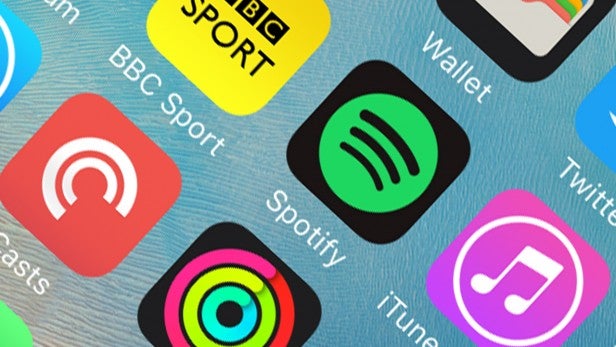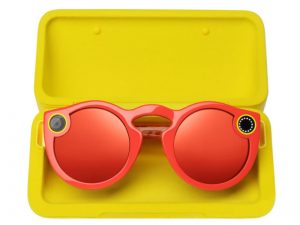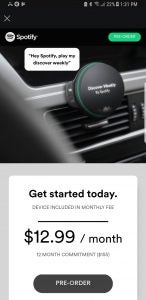Spotify launch: Everything we know about the firm’s rumoured smart device

Spotify hasn’t exactly been secretive about its plans to get into the hardware business, while we know that the music streaming service is working on hardware of some description, we don’t yet know exactly which form it will take.
From Amazon Echo-style smart speakers to car devices, there’s been no shortage of rumours about what Spotify might be working on, but so far the company is yet to confirm specifics.
What we do know is that Spotify is planning on announcing something at the end of April 2018, almost a month after the company went public and allowed its shares to be purchased by the general public.
With no official confirmation of exactly what the hardware is, here’s everything we do know.
Job listings suggest Spotify is working on its own hardware
Over the past couple of years, a variety of job listings have as much as confirmed that the music streaming company (which has until now been solely focused on software) is looking to get into hardware.
The first of these job listings emerged in April 2017 when Spotify was hiring for a senior hardware product manager to “deliver hardware directly from Spotify”.
However, the listing unsurprisingly didn’t go into specifics about what exactly this hardware would be. Instead it was gloriously ambiguous, and said that it would be a “category defining product akin to Pebble Watch, Amazon Echo and Snap Spectacles.”

Snapchat Spectacles, which we’re praying aren’t about to re-emerge with a Spotify logo on them
One source claimed that this hardware would be a wearable , which suggests that it might be closer to a Pebble Watch or Snapchat Spectacles than an Amazon Echo.
Similar job listings also pointed towards working with “major external platform providers within the voice space”, which at least implies voice control functionality like the Echo, even if the hardware itself is a wearable rather than a speaker.
Almost a year later in February 2018, a trio of new job adverts suggested that the company’s hardware efforts were nearing release.
The new listings said the company was looking for an “operations manager”, “senior project manager: hardware production”, and “project manager: hardware production and engineering”. All three made it sound as though the product had already been developed, but that the new challenge was getting it manufactured, marketed and sold.
Adverts start appearing for a car player
It’s not clear whether this is a different piece of hardware or the same, but back in February a group of Spotify users posted on Reddit to say that Spotify was advertising a new Spotify Car Player to them.
Users saw the advert alongside a price tag of $12.99 a month, which appeared to include a small plastic puck complete with 4G LTE connectivity.

A car player would make a certain amount of sense for Spotify. We listen to a lot of music in our cars, but in-car entertainment seriously lags behind what’s available on even budget smartphones.
As it stands, you’re lucky to even get Bluetooth connectivity, let alone a system that can run Spotify’s software natively.
Our prediction is that this product is intended to be a cheap and cheerful way to make it easier to listen to Spotify in your car, potentially opening up a large new segment of the market to the music streaming service.
That said, since it’s not a wearable we still think Spotify could have one or two other pieces of hardware in the works, which may be announced separately or alongside the car player.
Spotify tests voice search
The final piece of the Spotify hardware puzzle is voice search. We’ve known that the company is interested in voice since its original 2017 job listings, but back in March 2018 the company started testing its own voice search software with small amounts of users.
Naturally, Spotify continues to work with existing voice assistants like Alexa and Google Assistant, but having its own voice assistant could allow for more nuanced control such as saving items, or tapping directly into your daily mixes.
These voice search tests were done through the traditional Spotify app, but the software could just as easily be applied to a future wearable or car player.

Spotify’s upcoming event is expected to answer many of our questions
So what does it all mean?
Spotify has been involved with hardware before, but it’s always been content to let others develop the physical devices it then integrates with via its Spotify Connect wireless connectivity.
Likewise, the company has also played a part in the success of voice assistants Alexa and Google Assistant by allowing its service to be so readily integrated. Apple remains the only company to not want to integrate Spotify with its Siri voice assistant, presumably out of a desire to give its own Apple Music service an advantage.
Getting involved in hardware and software so directly would be a bold step for the company, and you have to wonder whether its recent public listing on the New York Stock Exchange has something to do with the timing of its upcoming announcement.
Potentially, Spotify could be looking at these developments in order to one day move away from being reliant on third-party companies, but we think it’s more likely that the company wants its own hardware and services as a backup, in case the likes of Google or Amazon start prioritising their own music services within their voice assistants or hardware.
Spotify is unlikely to disappear from your Amazon Echo or Apple Watch anytime soon, but the music service is going to try pretty hard to get you to take a hard look at its own hardware in an attempt to cut a bigger slice of the pie for itself.
What do you think Spotify is working on? Share your theories @TrustedReviews.


